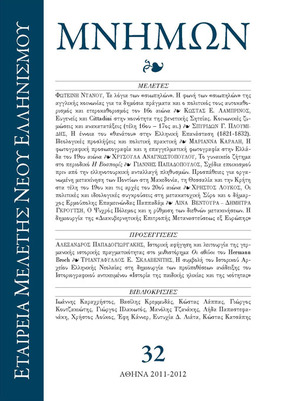Επί τινό λόγω αποστερείν αυτήν ψήφου; : Καθολική ανδρική ψηφοφορία και αποκλεισμός των γυναικών από την πολιτική στην Ελλάδα του 19ου αιώνα
Part of : Μνήμων ; Vol.24, 2002, pages 179-226
Issue:
Pages:
179-226
Parallel Title:
, «Wherefore deprive her of the vote?» : Universal male suffrage and the exclusion of women from politics in 19th century Greece
Section Title:
Articles
Author:
Abstract:
Through study of the Greek case, this article tries to explore the exclusion of women from political rights in the context of liberal democracy as a historiographical problem. In contrast to the vast majority of representative states at the time, political circumstances prevailing in Greece led to the constitutional establishment of universal male suffrage in 1864, though not without provoking the discontent of a sizeable portion of the political scene for several years thereafter. According to «conventional» historical accounts, there can be no doubt that women's exclusion from «universal suffrage» in 1864, while not explicity articulated in the Constitution or any pertinent legislation, was regarded as self-evident. Furthermore, prior to 1910-20 the possibility of attributing the vote to women did not preoccupy party politics, while a suffragist movement did not appear before the Inter-war period. Our own approach can be summarized as follows: exploration of the meaning of women's exclusion from political rights in a democratic conjuncture that assured those rights to all adult men may reveal the full dimensions of the conflict dynamic that democratic conquests presuppose. In the first place, this dynamic applies to men themselves, or more precisely to the less privileged among them. As empirical data reveal, the question of women's political rights, even if acquiring those rights was not an existing possibility, could appear as a constructive element of the political discourse: women's exclusion could have been put forward as one of the issues in the argument against universal male suffrage. It is precisely the self-evident and trivial nature of this exclusion together with that of children which could offer a more convincing argument against the conception of suffrage as a natural right. A lack of internal coherence and consistency in the argument of the advocates of «universal suffrage», could be pointed out through the emphasis, conversely, on the irrationality of a regime that guaranteed political participation down to the very last «illiterate» or «vagrant» man, while depriving all women of the vote, especially those who had the ability to possess and administrate property. Support for suffrage for those women was not totally absent from such argumentation, which served to reveal the contradictions that women's exclusion from political rights brought to the heart of the modern system for the legitimization of sovereignty. Through examination of the arguments employed by the science of constitutional law to justify exclusion, we observe a broader process of redefinition and rationalization of the existing gender hierarchy, in modern terms. Crystallized in the last quarter of 19th century, this process appealed to the notion of the biological and psychological «specificity» of «female nature)) in order to legitimize the incompatibility of women as a whole with politics.
Subject:
Subject (LC):




